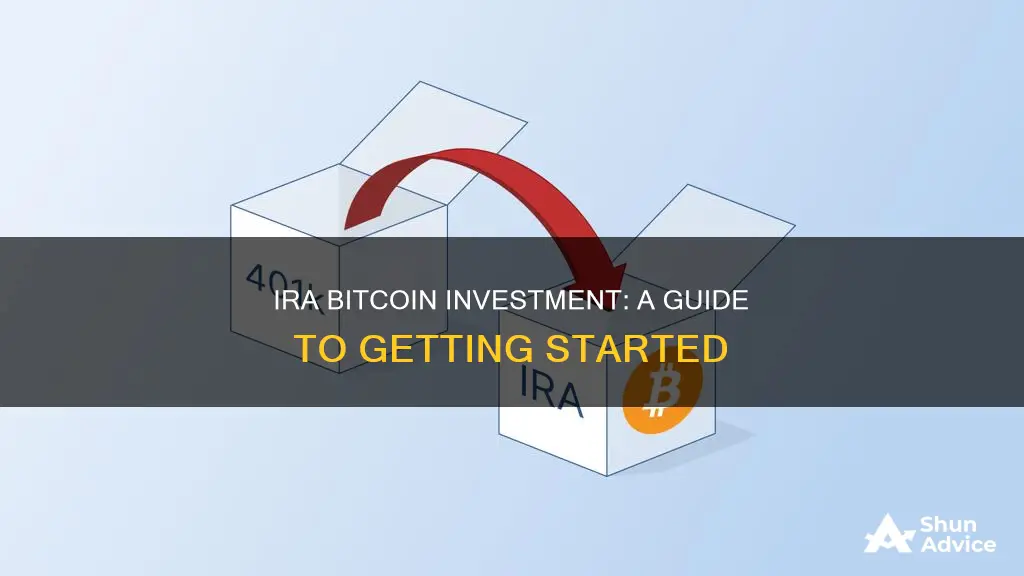
Investing in Bitcoin and other cryptocurrencies for retirement is a natural choice for many fans of cryptocurrency. They believe in the long-term potential of crypto and understand the substantial risks of holding Bitcoin over the long term. A Bitcoin IRA can provide the tax advantages of traditional and Roth IRAs, but it's important to understand the additional IRS rules and regulations governing this type of retirement account.
| Characteristics | Values |
|---|---|
| Type of IRA | Self-directed IRA |
| Tax advantages | Similar to traditional and Roth IRAs |
| Annual contribution limit (2024) | $7,000, or $8,000 if you're 50 or older |
| Investment options | Bitcoin, Ethereum, Litecoin, and several other cryptocurrencies |
| Custodians | Banks and other financial institutions |
| Storage | Cold storage, multi-signature wallet, or proprietary secure storage methods |
| Fees | Set-up fees, transaction fees, annual account management fees |
| Risks | Regulatory risk, insurance risk, market risk, fraud risk |
| Benefits | Diversification, potential returns, tax advantages |
What You'll Learn

Understand the risks of a Bitcoin IRA
Bitcoin IRAs are considered high-risk investments. Cryptocurrency valuations are subject to wide price swings, making these IRAs a risky venture for retirement savings. For example, the leading cryptocurrency, Bitcoin, has experienced significant price fluctuations, from virtually no value to about $16,000, and up to nearly $75,000. This makes it unsuitable for someone approaching retirement who needs stable and liquid assets.
Another risk to consider is the lack of fiduciary responsibility. Bitcoin IRA accounts are covered by custodians who manage self-directed accounts and allow for virtual currencies to be included in the required alternative investments. However, these custodians may not have any fiduciary responsibility to the investor for such investments. This means that if the investment goes wrong, the custodian will not be held accountable.
Additionally, there are several fees associated with Bitcoin IRAs, including initial setup fees, maintenance fees, trading fees, and custody fees. These fees can add up over time and impact your overall investment returns.
Another disadvantage of Bitcoin IRAs is the complexity it adds to your retirement planning. You cannot invest in traditional securities like stocks and bonds in a Bitcoin IRA, so you will need to open at least one additional retirement account to meet your investment needs. This can make your retirement planning more complicated and time-consuming.
Furthermore, there is a risk of fraud or cyber-attacks when dealing with cryptocurrencies. The U.S. Commodities Futures Trading Commission (CFTC) has warned about false crypto IRA companies claiming they had IRS approval, and the Securities and Exchange Commission has also issued alerts about fraudulent cryptocurrency IRAs. Therefore, it is essential to do your due diligence and only work with reputable companies when considering a Bitcoin IRA.
Finally, investing in Bitcoin and other cryptocurrencies is a very speculative investment. There is a potential for a total loss of investment, and it may not be suitable for all investors. Legislative and regulatory changes at the state, federal, or international level may also adversely affect the use, transfer, exchange, and value of cryptocurrencies.
Transferring Bitcoin from Circle Invest: A Step-by-Step Guide
You may want to see also

Find a Crypto IRA company
To invest your IRA money in Bitcoin, you'll need to find a Crypto IRA company that lets you buy cryptocurrency with the funds in your account. This is because the IRS does not allow you to place property (like securities or bonds) in retirement accounts. However, you can buy the property with funds from your retirement account and hold it there.
When choosing a Crypto IRA company, ensure they are regulated and licensed. The company should also be legitimate and secure, with measures in place to protect your assets.
- Bitcoin IRA: This company offers 24/7 trading, secure cold storage for digital assets, and up to $700 million of insurance protection. It has a 2.99% one-time deposit fee, a 2.00% transaction fee, and a 0.08% security fee billed monthly.
- BitIRA: BitIRA offers multi-encryption, end-to-end insurance coverage, and offline storage for digital assets. It has a $5,000 minimum to open an account and charges a $50 setup fee and $195 annual maintenance fee.
- ITrustCapital: iTrustCapital offers low trading and investing fees, with a 1% flat fee per transaction and no monthly, AUM, or broker fee. It has a $1,000 minimum to open an account.
- Coin IRA: Coin IRA provides customer education and a positive investor experience. It has a $5,000 minimum starting investment and no startup or maintenance fees.
- Alto CryptoIRA: Alto CryptoIRA offers access to over 200 cryptocurrencies and other alternative investment options. It utilizes hot and cold storage and is integrated with Coinbase.
Be sure to research each company thoroughly, compare fees, and ensure they meet your specific needs and goals.
Commemorative Coins: Worthy Investment or Costly Collectible?
You may want to see also

Open a self-directed IRA account
Opening a self-directed IRA account is the first step to investing your IRA money in Bitcoin. A self-directed IRA is a type of retirement account that allows you to hold alternative investments, such as Bitcoin and other cryptocurrencies, that are typically not found in conventional IRAs.
Step 1: Understand the Basics
Before opening a self-directed IRA, it is important to understand the basics. A self-directed IRA offers more flexibility in investment selection than traditional or Roth IRAs, but it is also subject to a significant number of rules and regulations. It is considered "self-directed" because, although a custodian or trustee administers the account, it is the account holder who directly manages the investments and assumes all risks.
Step 2: Choose a Custodian
To open a self-directed IRA, the IRS requires you to go through a custodian who will hold the account. Custodians of self-directed IRAs are often financial institutions or trust companies, and their role is to ensure that account owners follow IRA rules, such as annual contribution limits and reporting requirements to the IRS.
When selecting a custodian, consider factors such as whether they are approved by the IRS, their fee structure, and the types of investments they handle. Some popular custodians that offer Bitcoin investment options include Bitcoin IRA, BitIRA, and Equity Trust Company.
Step 3: Open the Account
Once you have chosen a custodian, you will need to open a self-directed IRA account. This can typically be done online and may only take a few minutes. You will need to provide personal information, such as your full legal name, address, Social Security number, banking information, and beneficiary details. There may also be a fee to establish your account.
Step 4: Fund the Account
After opening your self-directed IRA account, you will need to fund it. You can do this by transferring funds from an existing IRA or 401(k), making a contribution, or rolling over a 401(k) into the IRA. Remember that there are annual contribution limits for IRAs, and you should not contribute more than you are allowed.
Step 5: Purchase Bitcoin
Once your self-directed IRA is funded, you can use the funds to purchase Bitcoin through the custodian's platform. The process for buying Bitcoin through an IRA is similar to buying it on a cryptocurrency exchange, but the purchase is made through the custodian.
Step 6: Store Your Bitcoin Securely
Since your Bitcoin investment is held within your IRA, it is crucial to ensure that it is stored securely. Your custodian will likely offer secure storage options, such as cold storage or a multi-signature wallet, to protect your digital assets from theft.
Important Considerations:
- Fees: Self-directed IRAs typically come with additional fees, such as set-up fees, transaction fees, and annual account management fees. These fees can vary by custodian and investment type, so be sure to understand the cost structure before opening your account.
- Risk and Due Diligence: Self-directed IRAs offer greater flexibility but also come with higher risk. As the account holder, you are responsible for conducting due diligence on your investments and understanding the associated risks.
- Tax Implications: Self-directed IRAs provide tax advantages similar to traditional and Roth IRAs, but the tax reporting requirements can be complex. Be sure to consult with a tax professional to understand the tax implications of your investments.
- Fraud Risk: Fraudulent schemes are a concern with self-directed IRAs. Be cautious and carefully vet any investment opportunities to protect yourself from scams.
- Liquidity: Investments held in a self-directed IRA may be illiquid, making it challenging to access funds in case of an emergency.
By following these steps and considerations, you can open a self-directed IRA account and start investing your IRA money in Bitcoin.
Drip Investment Strategies for Bitcoin: Is it Possible?
You may want to see also

Fund your self-directed IRA account
Funding a self-directed IRA account with Bitcoin is a complex process that requires careful consideration and research. Here are the steps to fund your self-directed IRA account:
Step 1: Establish a Self-Directed IRA
Firstly, you need to set up a self-directed IRA with a custodian of such retirement plans. This is because a self-directed IRA allows you to invest in alternative assets like Bitcoin, which are not available through conventional IRAs. It is important to note that self-directed IRAs are not widely available and can be risky and expensive to maintain. The custodian will hold your assets and ensure your account adheres to IRS rules.
Step 2: Form an LLC
After establishing your self-directed IRA, you need to form and register a Limited Liability Company (LLC). This LLC will be 100% owned by the IRA, inheriting the same tax-advantaged status. The income and expenses related to the assets will flow through the IRA LLC as required by the Internal Revenue Service (IRS). The IRS considers cryptocurrency property for federal tax purposes, so the gains are tax-advantaged when owned by a retirement account.
Step 3: Open a Business Checking Account
Using the funds from the IRA, the LLC will then open a business checking account, also known as a "checkbook IRA". This gives the account owner full control over the transactions. The funds in this account are solely for investing in digital assets or other alternative assets allowed through self-direction.
Step 4: Open a Cryptocurrency Exchange Account
The final step is to open an account on a cryptocurrency exchange platform in the name and tax number of the IRA LLC. This is where you will be able to purchase Bitcoin and other cryptocurrencies. Remember that digital assets can also be purchased through brokers or by investing in funds that hold various digital currencies.
Important Considerations:
It is crucial to conduct thorough research and due diligence before including cryptocurrency in your self-directed IRA. Cryptocurrencies are highly volatile and unregulated, so investing in them can be risky. Additionally, there are strict rules from the IRS regarding prohibited investments in IRAs, and non-compliance can result in losing the account's tax-deferred status. It is recommended to consult a reputable retirement planner or financial advisor to determine if investing in cryptocurrency through a self-directed IRA is suitable for your financial circumstances.
Gold Coin Investment: A Beginner's Guide to Getting Started
You may want to see also

Buy Bitcoin through the IRA custodian's platform
Investing in Bitcoin through an IRA account is a complex process with many risks. It is important to do your research and understand the potential benefits and drawbacks before proceeding.
- Find a Crypto IRA Platform: The first step is to locate a Crypto IRA company that allows you to include crypto in a self-directed IRA. Examples of such companies include Bitcoin IRA, BitIRA, iTrustCapital, and Equity Trust Company. These companies enable you to control what is in your account and facilitate the purchase and sale of crypto.
- Open a Self-Directed IRA Account: Once you have chosen a custodian, you will need to open a self-directed IRA account. This type of account allows you to invest in alternative assets beyond traditional stocks, bonds, and mutual funds.
- Fund Your Self-Directed IRA: After opening the account, you will need to fund it. You can do this by transferring funds from an existing IRA or 401(k), making a contribution, or rolling over a 401(k) into an IRA. The maximum amount you can contribute per year is $7,000, or $8,000 if you're 50 or older.
- Purchase Bitcoin through the Custodian's Platform: Use the funds in your self-directed IRA to purchase Bitcoin through the custodian's platform. The process is similar to buying Bitcoin on a cryptocurrency exchange, but the purchase is made through the IRA custodian.
- Store Your Bitcoin Securely: Ensure that your Bitcoin investment is stored securely. Custodians may offer secure storage options, such as cold storage or multi-signature wallets, to protect your digital assets from theft.
It is important to remember that investing in Bitcoin through an IRA comes with additional fees, such as set-up fees, transaction fees, and annual account management fees. Additionally, there are strict rules from the Internal Revenue Service (IRS) regarding prohibited investments in IRAs, and you will be personally responsible for ensuring compliance.
Before proceeding, be sure to do your own research, understand the risks involved, and consider consulting a financial advisor to see if it is suitable for your financial circumstances.
US Coins: Worthy Investment or Waste of Money?
You may want to see also
Frequently asked questions
A Bitcoin IRA is a self-directed IRA that holds cryptocurrency. Self-directed IRAs let you invest in alternative assets like cryptocurrency, real estate, precious metals, and collectibles, which are excluded from conventional IRAs.
You can opt for a traditional IRA or a Roth IRA and access their substantial tax benefits. You can fund your self-directed IRA by transferring funds from an existing IRA or workplace 401(k), making a contribution, or rolling over a 401(k) into an IRA. Then, use the funds to purchase Bitcoin through the custodian's platform.
A Bitcoin IRA can provide diversification to your retirement portfolio, as cryptocurrency is not correlated with stocks and bonds. It also offers the potential for huge gains and has certain tax advantages.
Bitcoin IRAs tend to have additional fees, such as set-up fees, transaction fees, and annual account management fees, which are seldom found in normal IRAs. There are also limitations on which crypto exchanges you can trade on and the volatile nature of cryptocurrency means there is a substantial risk to your retirement portfolio.
First, decide where to open your account by locating a custodian that hosts self-directed IRAs and enables cryptocurrency trades. You will need your full legal name, address, Social Security number, and banking information. Compare fees and ensure the account types, exchanges, and cryptocurrencies available align with your goals.







